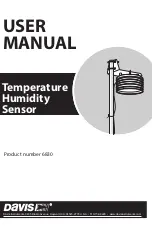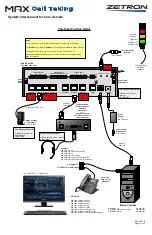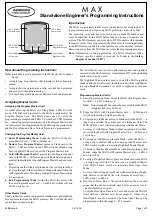
MAN0878-09-EN_XLE_XLT_UserManual
A u g u s t 2 3 , 2 0 1 8
P a g e 152 | 158
20.3 CsCAN Network
For complete information on setting up a CsCAN network, refer to CAN Networks manual
(MAN0799) by visiting our website.
Network status, node ID, errors, and baud rate in the controller system menu are all in reference
to the CsCAN network. These indications can provide performance feedback on the CsCAN
network and can also be used to aid in troubleshooting. Refer to
Chapter 9
for full details on
the System Menu.
20.3.1 CsCAN Network Troubleshooting Checklist
1.
Use the proper Belden wire type or equivalent for the network as specified in MAN0799.
2.
The XLE/XLT does not provide 24VDC to the network. An external voltage source must be
used for other devices such as SmartStix I/O.
3.
Check voltage at both ends of the network to ensure that voltage meets specifications of
attached devices.
4.
Proper termination is required. Use 121
Ω
(or 120
Ω
) resistors at each end of the network. The
resistors should be placed across the CAN_HI and CAN_LO terminals.
5.
Measure the resistance between CAN_HI and CAN_LO. If the network is properly wired and
terminated there should be around 60
Ω
.
6.
Check for
duplicate node ID’s.
7.
Keep proper wires together. One twisted pair is for V+ and V- and the other twisted pair is
used for CAN_HI and CAN_LO.
8.
Make sure the baud rate is the same for all controllers on the network.
9.
Assure shields are connected at one end of each segment -- they are not continuous through
the network.
10.
Do not exceed the maximum length determined by the baud rate and cable type.
11.
Total drop length for each drop should not exceed 6
m (20’
). A drop may include more than
one node. The drop length adds to the overall network length.
12.
Network should be wired in "straight line" fashion, not in a "star" pattern.
13.
In applications requiring multiple power supplies, make sure the V- of all supplies is
connected together and to earth ground at one place only.
14.
In some electrically noisy environments it may be necessary to add repeaters to the
network. Repeaters can be used to add additional nodes and/or distance to the network
and protect the signal against noisy environments.







































